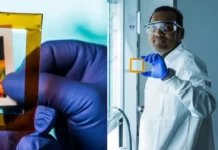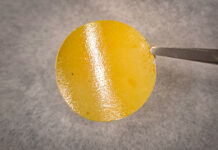
Graphene coatings may offer the ability to control the water evaporation process from various surfaces, according to new research.
The study, carried out by a team from the Chinese Academy of Sciences and the Collaborative Innovation Center of Quantum Matter (Beijing), looked at the interactions of water molecules with various graphene-covered surfaces.
Lead author Dr. Yongfeng Huang, from the Chinese Academy of Sciences, said: “Water droplet evaporation is a ubiquitous and complicated phenomenon, and plays a pivotal role in nature and industry. Understanding its mechanism at the atomic scale, and controlling evaporation rate rationally is important for applications including heat transfer and body-temperature control. However, it remains a significant challenge.”
The team’s experiments showed that a graphene coating controls water evaporation by suppressing the evaporation rate on hydrophilic surfaces and accelerating evaporation on hydrophobic ones.
Dr. Huang said: “More importantly, we found graphene is ‘transparent’ for evaporation. When a hydrophilic surface is coated with graphene, the contact line of the water droplet is dramatically shortened or elongated, because of adjustment in wetting angles. This leads to changes in the evaporation rate.”
The researchers wanted to understand the ‘transparency’ in graphene-mediated evaporation and uncover its underlying structure on the atomic scale. To do this, they conducted molecular dynamics simulations on water droplet evaporation, on surfaces with and without a graphene coating.
For the first time, they identified the atomic-scale mechanism for substrate-induced evaporation events. They found that water molecule forms a precursor state at the contact line before it evaporates.
Dr. Huang explained: “Further analysis showed water density in evaporation transition states is largest at the contact line, then decreases exponentially as it goes away from the substrate. Single water desorption at the contact line dominates the droplet evaporation process. Since the graphene does not alter the binding energy of a single water molecule, it has negligible effects on evaporation of per contact line.
Read more: Graphene could be key to controlling water evaporation
thumbnail courtesy of phys.org














